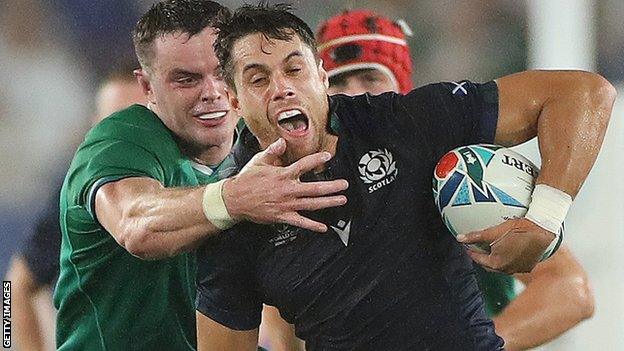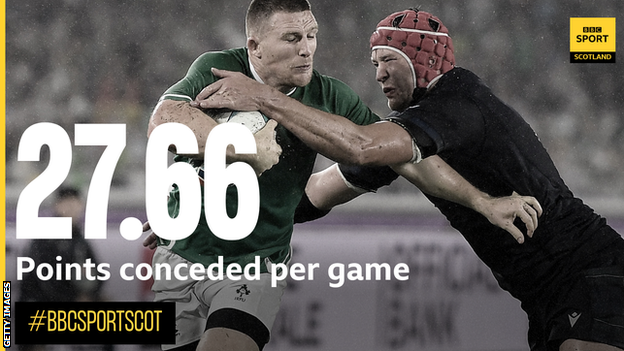Ireland 27-3 Scotland: Talk is cheap for Gregor Townsend's side
- Published

Scotland began their Rugby World Cup campaign with an insipid loss to Ireland in Yokohama
After Scotland completed their call-to-arms press conference on Saturday at Takanawa in Tokyo, it emerged that 100 days had passed since they first met up as a squad to prepare for the World Cup.
One hundred days of training sessions and meetings, of travel and games, of previews and reviews and planning for the opener against Ireland in Yokohama.
Sunday was day 101, which was kind of appropriate given its connotations since George Orwell (an anagram of his name being Ell Gregor Woe) wrote about people being tormented in his novel Nineteen Eighty-Four. You have Room 101 and now you have Rugby 101; Orwell's dystopian future and Townsend's disturbing present.
It's hard to know how many times Scotland's players and management spoke during those first 100 days, but it was in the dozens. Fighting talk, too. They threw back their shoulders and gave it large about how good they can be.
Before the Ireland game, they spoke about how hard they'd been working on defence, how much they were going to target Johnny Sexton, how a herd of rampaging wildebeest wouldn't make them take a backward step against the Irish, how they were saving their very best stuff for the World Cup.
Of course the Scots have to back themselves in public. They could hardly don the black cap and pass a World Cup death sentence on themselves, but they needed to deliver a performance and they never came close. Their lights went out early, if they ever came on in the first place.
Scotland are sold on their own promise, which only rarely manifests itself. They win a few games and everybody gets giddy, including us in the media, who are so starved of positivity when reporting on this team that every big victory at Murrayfield is thought of as a turning point.
It only becomes a turning point when they actually turn, not when they approach the turn before going into reverse by delivering one win in five games in the most recent Six Nations. From their past six tournament matches, they have a single victory, against Italy at home.
After six minutes in Yokohama, they conceded the first try. From the moment the barnstorming Iain Henderson ran free of Stuart McInally and Grant Gilchrist, you just knew that the score was coming.
You'd have bet the house on it because the score nearly always comes in those moments. Scotland's defence was slow to get round the corner at the next ruck and James Ryan went over. Easy.
After 14 minutes, they conceded a second try off a driven line-out. Once more, the second that maul started to move forward, anybody who watches this Scotland team would have gone all-in on an Ireland score. Some teams have the organisation and belligerence to hold teams out in those critical times. Too often, Scotland fold when their defence is stressed. Ireland head coach Joe Schmidt knows that better than anybody. He played on it.
A third one came after 26 minutes off a Scotland error down the other end of the field. A scrum, some hard-running from CJ Stander, more slackness from Scotland and another soft touch try, this one from Tadhg Furlong. Not even half an hour played and the game was done. One hundred days of preparation - for this?
There is a view out there - shared by some of the players that Scotland have faced in very recent times - that some of them have a little too much to say for themselves when it comes to the collective talents of the team. People who have actually won things in this game listen incredulously to the talk from some Scotland players and coaches about wanting to play the fastest brand of rugby in the world - a mantra repeated again by one of their number after Sunday's beating.
Scotland and Ireland are Celtic cousins but in rugby terms there's no relation. This year has been brutally hard for these Irish players, their form diminished, their confidence severely damaged, their critics louder and louder. No amount of silverware from their all-conquering 2018 has shielded them from flak.
They're hard-bitten men, though. Relentless. Tough physically and mentally. Strength of character - and quality of player and coach - looks to be getting them through their slump. They're a re-emerging force that would have drunk in Scotland's chat and quietly fed off it.
Only the most hopelessly optimistic (or delusional) Scotland fan would have predicted a victory on Sunday. There was little evidence to suggest it was likely. Ireland had won five of the six meetings since Schmidt entered the scene as coach. They scored 21 tries in those games and won by an average of 14 points.
Yes, their 2019 form had been poor up until their most recent win over Wales in Dublin, but that win suggested they were getting back to what they once were. It was a portent of doom for the Scots.
Ireland were hot favourites and there would have been little shame in Scotland losing to them so long as they made their opponents fight for it, which they didn't. They talked the talk and then fell in a heap. The galling thing is not that Scotland lost, it's that Scotland never turned up.

In their past nine away matches against Tier One opposition, Scotland have conceded an average of nearly 28 points per game
Townsend's admission in the aftermath that they lacked energy and aggression at the start of the game was a shocker even though we'd heard, and seen, the same thing before. And recently. And more than once.
Last month, when passive in a 32-3 defeat against France in Nice, the Scotland defence coach, Matt Taylor, spoke about the team's lack of urgency.
"On reflection, maybe we should have poked and prodded and fired up the boys more than we did," he said.
They need poking and prodding to get themselves up for a Test match?
"We just left it to the players to get themselves in the right frame of mind," he added. "With it being a warm-up game in a nice place like Nice, we just assumed that level of intensity was going to be there and it wasn't."
It wasn't there in Yokohama for a World Cup game, it wasn't there in Nice, it wasn't there in the opening half an hour at Twickenham when England scored four tries, it wasn't there against Wales and Ireland in Edinburgh or against France in Paris.
In their past 11 competitive games, Scotland have conceded 12 tries in the opening 14 minutes. In the same period, Ireland have conceded two. The lack of energy and aggression is a recurring weakness that Townsend hasn't fixed.
On Monday they head for Kobe, where they play Samoa a week later. Shorn of finance and with their players poached by other nations, the Pacific Islanders continue to be subjected to the most shameful treatment by the world game. They've lost to the USA, Fiji and Australia in their past three games, but there were signs against the Wallabies that they're beginning to put something together again for this World Cup. Four years ago, they scared the wits out of Scotland in Newcastle.
Nothing that Samoa, or Japan, will have seen on Sunday will give them any concern. The pair of them remain underdogs but they'll slap a giant target on the backs of all these Scotland players and go after them with intent. In the case of the Samoans, a venomous intent.
The nations have already met on Townsend's watch. It was in the autumn of 2017, a 44-38 win at Murrayfield. Scotland scored six tries that day. Samoa scored five. Scotland should win this next game, but they'll be battered in the process. This week will be grim. They're in a hole now. A deep one.
